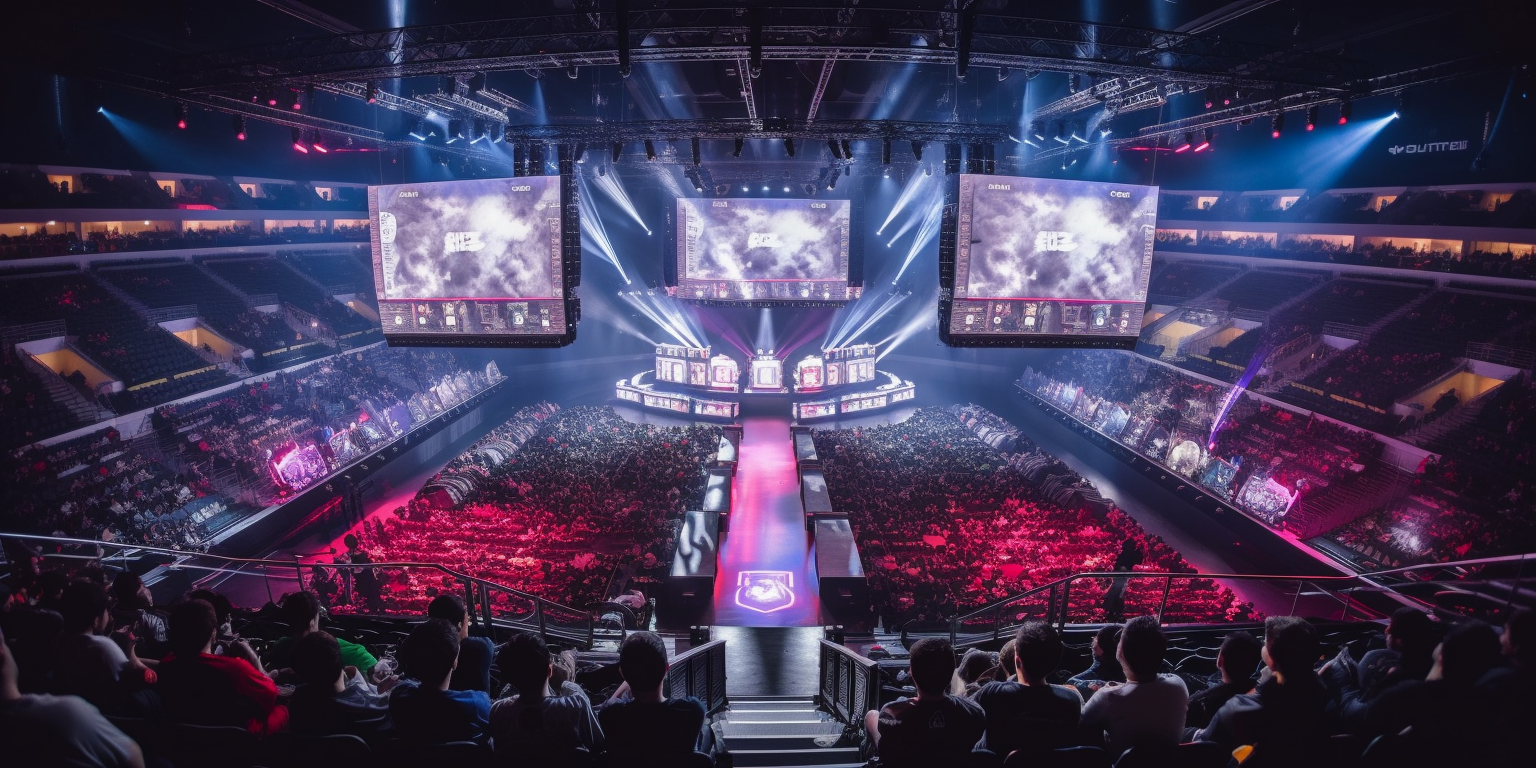The world of sports has always been a source of entertainment and excitement for fans all over the world. However, in recent years, a new form of competition has emerged that is taking the sports industry by storm: esports. Esports, or competitive gaming, is the practice of playing video games at a professional level, with virtual competitions and tournaments attracting millions of viewers worldwide.
Esports has become a major player in the sports industry, with major brands and organizations investing in the industry. The rise of esports has also led to new opportunities for fan engagement, with virtual competitions and online streaming platforms allowing fans to connect with their favorite players and teams in new and exciting ways.
The intersection of sports and esports has created a new landscape for competition and entertainment, with traditional sports organizations and teams now entering the world of esports. This has led to the creation of new leagues and tournaments, such as the NBA 2K League and the eMLS Cup, which bring together the worlds of sports and esports.
The rise of esports has also led to new opportunities for athletes, with professional gamers now being recognized as athletes in their own right. This has led to the creation of new training facilities and programs, as well as new career opportunities for those looking to enter the world of esports.
Overall, the intersection of sports and esports has created a new era of competition and entertainment, with virtual competitions and fan engagement becoming an integral part of the sports industry. As the world of esports continues to grow and evolve, it will be interesting to see how it continues to impact the sports industry and the world of entertainment as a whole.
Benefits of Esports
Esports, or competitive gaming, has been on the rise in recent years and has become a significant player in the sports industry. Virtual competitions have become a popular form of entertainment, attracting millions of fans worldwide. The benefits of esports are numerous, including increased fan engagement, new revenue streams, and the potential for global expansion.
One of the most significant benefits of esports is the level of fan engagement it generates. Esports events attract millions of viewers, with some tournaments reaching over 100 million viewers worldwide. This level of engagement is due to the accessibility of esports, as fans can watch competitions from anywhere in the world, at any time. Additionally, esports events often have interactive elements, such as live chats and social media engagement, which further increase fan engagement.
Esports also provides new revenue streams for the sports industry. Traditional sports leagues have seen a decline in viewership and attendance in recent years, while esports has seen a significant increase in both. This has led to traditional sports leagues investing in esports, creating new revenue streams for both industries. For example, the NBA has created the NBA 2K League, a professional esports league featuring NBA teams and players.
Finally, esports has the potential for global expansion. Traditional sports leagues are often limited by geography, with teams and players only able to compete in certain regions. Esports, on the other hand, has no geographical limitations, allowing for global competition and expansion. This has led to the creation of international esports tournaments, such as the League of Legends World Championship, which attracts teams and players from all over the world.
In conclusion, the rise of esports has had a significant impact on the sports industry, providing benefits such as increased fan engagement, new revenue streams, and global expansion. As esports continues to grow, it will be interesting to see how it intersects with traditional sports and how the two industries will continue to evolve together.
The Evolution of Competitive Gaming
The world of sports has undergone a significant transformation in recent years with the rise of esports. Esports, or competitive gaming, has become a global phenomenon, attracting millions of fans and generating billions of dollars in revenue. The sports industry has taken notice of this trend and is now exploring ways to incorporate esports into their business models.
The evolution of competitive gaming can be traced back to the early days of video games. In the 1970s and 1980s, video game tournaments were held in arcades and gaming conventions. However, it wasn’t until the 1990s that competitive gaming began to gain mainstream attention. The release of games like Doom and Quake paved the way for the first professional gaming leagues.
Today, esports has become a massive industry, with tournaments and leagues held around the world. Games like League of Legends, Dota 2, and Overwatch have become household names, attracting millions of viewers to virtual competitions. The prize pools for these tournaments can reach millions of dollars, with top players earning salaries that rival those of professional athletes.
The sports industry has recognized the potential of esports and is now exploring ways to incorporate it into their business models. Many traditional sports teams and leagues have created their esports teams, while others have partnered with existing esports organizations. This has led to increased fan engagement, as fans of traditional sports can now follow their favorite teams in both the physical and virtual worlds.
In conclusion, the rise of esports has had a significant impact on the sports industry. Competitive gaming has become a global phenomenon, attracting millions of fans and generating billions of dollars in revenue. The sports industry has recognized the potential of esports and is now exploring ways to incorporate it into their business models. This has led to increased fan engagement and has created new opportunities for both traditional sports and esports.
Virtual Competitions and Fan Engagement
The world of sports has been rapidly evolving over the past few years, with the rise of esports and competitive gaming. Esports, or electronic sports, refers to competitive video gaming, where players compete against each other in virtual competitions. This industry has been growing at an unprecedented rate, with millions of fans tuning in to watch their favorite players battle it out in games like League of Legends, Fortnite, and Overwatch.
The sports industry has taken notice of this trend and has started to invest in esports. Many traditional sports teams and organizations have created their own esports teams, while others have partnered with existing esports organizations. This has led to a crossover between the two industries, with esports events being held in traditional sports arenas and sports teams hosting their own esports tournaments.
One of the biggest advantages of esports is the ability to engage with fans in new and innovative ways. Esports events are often streamed online, allowing fans from all over the world to watch and participate in the action. This has led to a new level of fan engagement, with fans interacting with each other and with the players in real-time.
Esports has also opened up new opportunities for sponsorship and advertising. Brands that may not have been interested in traditional sports are now investing in esports, seeing it as a way to reach a younger and more tech-savvy audience. This has led to some interesting partnerships, such as the collaboration between the NBA and the esports organization 2K League.
In conclusion, the rise of esports and competitive gaming has had a significant impact on the sports industry. It has opened up new opportunities for fan engagement, sponsorship, and advertising, while also creating a new form of entertainment for millions of fans around the world. As the industry continues to grow, it will be interesting to see how traditional sports and esports continue to intersect and evolve.
Esports and the Sports Industry
Esports, or competitive gaming, has been on the rise in recent years, and it’s not just a trend among gamers. The sports industry has taken notice of the growing popularity of virtual competitions and has started to invest in esports teams and events.
Esports has become a lucrative industry, with millions of dollars in prize money and sponsorships up for grabs. The sports industry has recognized the potential for fan engagement and revenue generation through esports, and many professional sports teams have started to invest in esports teams or host their own esports events.
One example of this is the NBA 2K League, which is a professional esports league featuring teams owned by NBA franchises. The league has gained a following among both traditional sports fans and esports enthusiasts, and it has helped to bridge the gap between the two communities.
Esports has also become a way for sports teams to engage with fans in new and innovative ways. For example, the NFL has partnered with EA Sports to create the Madden NFL Club Championship, which allows fans to compete in virtual football tournaments for a chance to represent their favorite NFL team in the finals.
The rise of esports has also led to the development of new technologies and platforms for virtual competitions. Virtual reality and augmented reality have become increasingly popular in esports, allowing players and fans to immerse themselves in the virtual world of competitive gaming.
In conclusion, the intersection of sports and esports has created a new and exciting industry that is rapidly growing in popularity. The sports industry has recognized the potential for fan engagement and revenue generation through esports, and it has started to invest in this emerging market. As technology continues to advance, we can expect to see even more innovation in the world of competitive gaming.
Limitations
The world of sports has been rapidly evolving over the past few years, with the rise of esports and competitive gaming. Esports, or electronic sports, refers to virtual competitions where players compete against each other in video games. This industry has been growing at an unprecedented rate, with millions of fans tuning in to watch their favorite players battle it out in games like League of Legends, Fortnite, and Overwatch.
The sports industry has taken notice of this trend and has started to invest in esports. Many traditional sports teams and organizations have created their own esports teams, while others have partnered with existing esports organizations. This has led to a crossover between the two industries, with sports fans becoming interested in esports and vice versa.
One of the biggest advantages of esports is the ability to engage with fans in new and innovative ways. Esports events are often streamed online, allowing fans from all over the world to watch and participate in the action. This has led to a new level of fan engagement, with fans interacting with each other and with the players in real-time.
Another advantage of esports is the ability to reach a younger audience. Many traditional sports are struggling to attract younger fans, but esports has a built-in audience of young people who are passionate about gaming. This has led to new sponsorship opportunities and revenue streams for sports organizations.
Overall, the intersection of sports and esports is an exciting development for both industries. As esports continues to grow, we can expect to see more collaboration and innovation between the two worlds. Whether you’re a sports fan or a gamer, there’s never been a better time to get involved in the world of competitive gaming.
Esports has been on the rise for the past few years, and it’s not just a passing trend. The competitive gaming industry has become a force to be reckoned with, and it’s starting to intersect with the sports industry in a big way.
Virtual competitions have become a popular way for fans to engage with their favorite sports teams and players. Many professional sports leagues have started their own esports leagues, such as the NBA 2K League and the NFL’s Madden Championship Series. These leagues allow fans to compete against each other using virtual versions of their favorite teams and players.
Esports has also become a way for traditional sports teams to expand their fan base and engage with younger audiences. Many sports teams have started their own esports teams, such as the Philadelphia 76ers’ NBA 2K team and the Dallas Cowboys’ Madden team. These teams allow fans to connect with their favorite sports teams in a new and exciting way.
The rise of esports has also led to new opportunities for athletes. Many professional gamers are now making a living playing competitive video games, and some traditional sports athletes have even started to dabble in esports. For example, NBA player Gordon Hayward has been known to stream himself playing video games on Twitch.
Overall, the intersection of sports and esports is an exciting development for both industries. It allows fans to engage with their favorite sports teams and players in new and innovative ways, while also providing new opportunities for athletes and gamers alike. As the esports industry continues to grow, we can expect to see even more crossover between sports and competitive gaming in the future.






